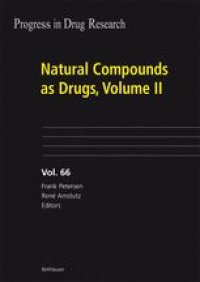
Ebook: Natural Compounds as Drugs: Volume II
Author: Axel A. Brakhage Julia Schuemann Sebastian Bergmann (auth.) Frank Petersen René Amstutz (eds.)
- Tags: Pharmacology/Toxicology, Biochemistry general
- Series: Progress in Drug Research 66
- Year: 2008
- Publisher: Birkhäuser Basel
- Edition: 1
- Language: English
- pdf
The use of drug substances derived from plants, fungi, bacteria, and marine organisms has a long tradition in medicine. Together with their derivatives, and synthetic compounds deduced from natural product precursors, they represent a major part of today's pharmaceutical market.
Within the fast developing discipline of molecular biology, natural products also play an important role as tool compounds in pathway screening and validation of target identification concepts. They provide innovative opportunities in drug discovery, leading to a detailed understanding of biological pathways and revealing the functions of involved enzymes or receptors.
This book highlights new trends and aspects in natural products research. It discusses the biodiversity-driven approaches which are now of eminent importance in natural products research, addressing the question why natural products display such a complex chemical information, what makes them often unique and what their characteristics are. Practical questions such as supply of natural substances and production optimization strategies are also covered.
The use of drug substances derived from plants, fungi, bacteria, and marine organisms has a long tradition in medicine. Together with their derivatives, and synthetic compounds deduced from natural product precursors, they represent a major part of today's pharmaceutical market.
Within the fast developing discipline of molecular biology, natural products also play an important role as tool compounds in pathway screening and validation of target identification concepts. They provide innovative opportunities in drug discovery, leading to a detailed understanding of biological pathways and revealing the functions of involved enzymes or receptors.
This book highlights new trends and aspects in natural products research. It discusses the biodiversity-driven approaches which are now of eminent importance in natural products research, addressing the question why natural products display such a complex chemical information, what makes them often unique and what their characteristics are. Practical questions such as supply of natural substances and production optimization strategies are also covered.
The use of drug substances derived from plants, fungi, bacteria, and marine organisms has a long tradition in medicine. Together with their derivatives, and synthetic compounds deduced from natural product precursors, they represent a major part of today's pharmaceutical market.
Within the fast developing discipline of molecular biology, natural products also play an important role as tool compounds in pathway screening and validation of target identification concepts. They provide innovative opportunities in drug discovery, leading to a detailed understanding of biological pathways and revealing the functions of involved enzymes or receptors.
This book highlights new trends and aspects in natural products research. It discusses the biodiversity-driven approaches which are now of eminent importance in natural products research, addressing the question why natural products display such a complex chemical information, what makes them often unique and what their characteristics are. Practical questions such as supply of natural substances and production optimization strategies are also covered.
Content:
Front Matter....Pages i-x
Activation of fungal silent gene clusters: A new avenue to drug discovery....Pages 1-12
Total synthesis studies on macrocyclic pipecolic acid natural products: FK506, the antascomicins and rapamycin....Pages 13-186
Application of natural product-inspired diversity-oriented synthesis to drug discovery....Pages 187-216
Cheminformatics analysis of natural products: Lessons from nature inspiring the design of new drugs....Pages 217-235
Chemical-genetic approaches for exploring the mode of action of natural products....Pages 237-271
Epothilones as lead structures for new anticancer drugs — pharmacology, fermentation, and structure-activity-relationships....Pages 273-334
Histone deacetylase inhibitors from microorganisms: the Astellas experience....Pages 335-359
Ascomycete derivative to MS therapeutic: S1P receptor modulator FTY720....Pages 361-381
Artemisinin — an innovative cornerstone for anti-malaria therapy....Pages 383-422
Back Matter....Pages 423-427
The use of drug substances derived from plants, fungi, bacteria, and marine organisms has a long tradition in medicine. Together with their derivatives, and synthetic compounds deduced from natural product precursors, they represent a major part of today's pharmaceutical market.
Within the fast developing discipline of molecular biology, natural products also play an important role as tool compounds in pathway screening and validation of target identification concepts. They provide innovative opportunities in drug discovery, leading to a detailed understanding of biological pathways and revealing the functions of involved enzymes or receptors.
This book highlights new trends and aspects in natural products research. It discusses the biodiversity-driven approaches which are now of eminent importance in natural products research, addressing the question why natural products display such a complex chemical information, what makes them often unique and what their characteristics are. Practical questions such as supply of natural substances and production optimization strategies are also covered.
Content:
Front Matter....Pages i-x
Activation of fungal silent gene clusters: A new avenue to drug discovery....Pages 1-12
Total synthesis studies on macrocyclic pipecolic acid natural products: FK506, the antascomicins and rapamycin....Pages 13-186
Application of natural product-inspired diversity-oriented synthesis to drug discovery....Pages 187-216
Cheminformatics analysis of natural products: Lessons from nature inspiring the design of new drugs....Pages 217-235
Chemical-genetic approaches for exploring the mode of action of natural products....Pages 237-271
Epothilones as lead structures for new anticancer drugs — pharmacology, fermentation, and structure-activity-relationships....Pages 273-334
Histone deacetylase inhibitors from microorganisms: the Astellas experience....Pages 335-359
Ascomycete derivative to MS therapeutic: S1P receptor modulator FTY720....Pages 361-381
Artemisinin — an innovative cornerstone for anti-malaria therapy....Pages 383-422
Back Matter....Pages 423-427
....